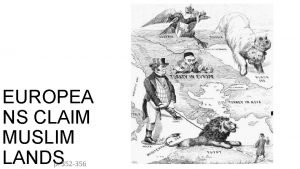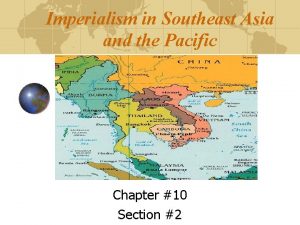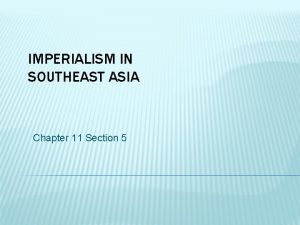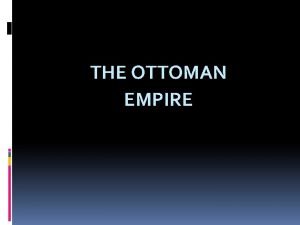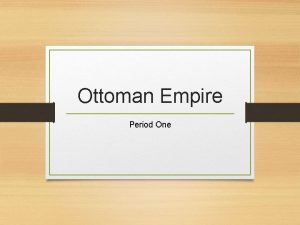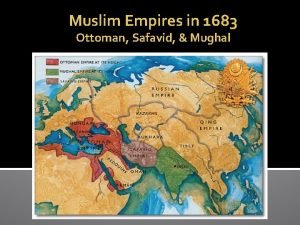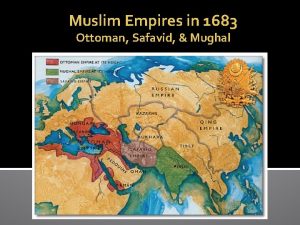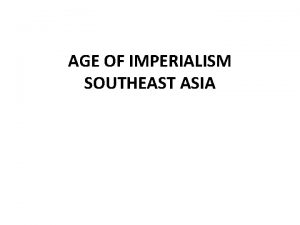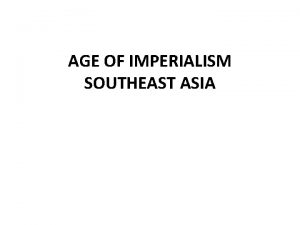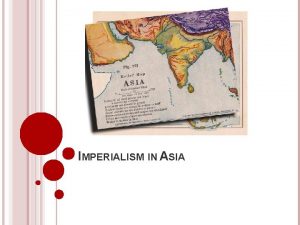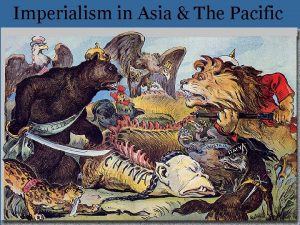Imperialism in Asia Muslim Lands and India Ottoman














- Slides: 14

Imperialism in Asia Muslim Lands and India

Ottoman Empire Loses Power • Suleyman dies 1566 – begins line of weak sultans • Geopolitics – taking land strategically for positioning or products • Attractive land area – Mediterranean and Atlantic access • Russians wanted control and a warm port on Black Sea • Allied with Ottoman enemies and waged war

Crimean War • Russia vs. Ottomans – France and Britain aided Ottomans. Why? • Ottomans win, but demonstrate military weakness • Russians aided Balkans in revolt against Ottomans • Continued to lose land


Egypt Update • After watching Ottoman decline, Egypt recognizes that they need to adjust to modern world • Begin military and economic reforms • Building of Suez Canal – Paid for by French private investment groups – Egypt couldn’t pay even the interest on $450 million debt – British overseeing the financial control of canal • By 1882, British occupied Egypt


Beginnings of British Imperialism in India • Britain had economic interest in the area in 1600’s – British East India Company • Mughal Empire ruled most of India – By early 1700’s empire was breaking up – Small states ruled by a maharajah • From 1757 to 1858 East India Company controlled India

British East India Company • Company specializing in trading Indian goods like spices • Became powerful due to advancement of European naval fleets • Surpassed Spain and Portugal after the destruction of Spanish Armada in 1588 • Ruled with little British government regulation

India becomes Britain’s “Jewel in the Crown” • Seen as most valuable colony • Huge amount of resources and large population • British controlled economy – Raw materials had to go to Britain – Citizens had to buy British goods – Did not allow competition with British goods • Newly developed railroads connected ports with interior cities

Effects on India • Negative: – Destruction of Indian industries – Loss of self-sufficiency – Loss of traditional Indian culture • Positive: – Vast railroad network connected Indian regions and cities – Improved infrastructure modernized nation – Increased education

Beginnings of mutiny • • British had racist attitudes towards Indians resented British attempts to convert them to Christianity Indian feelings of Nationalism Indian desire for independent economy


The Sepoy Mutiny • • • Sepoy: Indian soldiers serving under British command Refused beef/pork fat cartridges (cultural reasons) Sepoys jailed, causes other sepoys to rebel Rebellion spreads across northern India Divisions within sepoys – Hindus vs. Muslims • East India Company takes control again after a year of fighting

Results of Sepoy Mutiny • British take direct control – The Raj • Fueled racial attitudes of British • Increased distrust between Indians and British • Nationalism and desire for self-rule
 Chapter 27 section 3 european claim muslim lands
Chapter 27 section 3 european claim muslim lands Chapter 27 section 3 european claim muslim lands
Chapter 27 section 3 european claim muslim lands Chapter 11 section 3 european claim muslim lands
Chapter 11 section 3 european claim muslim lands Europeans claim muslim lands
Europeans claim muslim lands Chapter 20 section 2 european nations settle north america
Chapter 20 section 2 european nations settle north america Chapter 27 section 3 european claim muslim lands
Chapter 27 section 3 european claim muslim lands New imperialism vs old imperialism
New imperialism vs old imperialism Imperialism in africa webquest
Imperialism in africa webquest Imperialism in southeast asia and the pacific
Imperialism in southeast asia and the pacific Old imperialism vs new imperialism chart
Old imperialism vs new imperialism chart Hindu vs islam
Hindu vs islam How muslim came to india
How muslim came to india All india muslim league 1906
All india muslim league 1906 All india muslim league 1906
All india muslim league 1906 Imperialism in southeast asia chapter 11 section 5
Imperialism in southeast asia chapter 11 section 5





